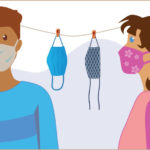Surgery during COVID-19: Answers for parents

Any time a child needs surgery, safety is a natural concern. With COVID-19, many parents are feeling more concerned than ever.
“As a parent myself, one of the scariest things about this pandemic is that you’re often having to make decisions based on incomplete information, says Dr. Prathima Nandivada, an attending surgeon in the Department of Surgery at Boston Children’s Hospital.
You might worry about your child’s safety or whether your child’s operation will be postponed. If you have other children at home, you may wonder how to explain why they can’t visit their sibling in the hospital. Below, Boston Children’s surgeons answer questions about surgical safety and what to expect during the pandemic.
How have Boston Children’s surgical units responded to COVID-19?
Dr. Donald Bae, clinical chief of orthopedic surgery, Orthopedic Center: Since the earliest days of the pandemic, Boston Children’s leaders have been making decisions based on three priorities: maximizing patient safety, providing critical and timely care, and keeping our clinicians and employees safe. For instance, we have changed our visitor policy to reduce the number of people in the hospital and are screening every person who enters the hospital for symptoms of COVID-19.
Surgery and safety during the COVID-19 pandemic
Dr. Carlos Estrada, urologist-in-chief, Department of Urology: Whenever possible, we consult with families via telemedicine so they can make one less trip to the hospital. We have installed Plexiglass barriers in our surgical waiting areas so parents have a safe place to sit while their child is undergoing surgery. And everyone in the surgical waiting area, and anywhere else in the hospital, is required to wear a mask. We also have hand-sanitizer dispensers throughout the area.
Our operating rooms themselves are highly sterile environments. Our long-standing OR cleaning procedures protect patients from any sort of infection, including COVID-19.
Dr. Nandivada: Boston Children’s was one of the first institutions in the greater Boston area to adopt universal mask usage. This was well before it became a policy at the government level. It’s a testament to how responsive our leadership was to making sure that every single one of our patients and member of the staff was safe as we learned more about how to respond safely to the COVID-19 pandemic.
What are the hardest parts of COVID-19 for families whose child needs an operation?
Dr. Nandivada: This pandemic has been especially challenging for families whose children have long hospital stays. Boston Children’s had to change its visitor policy during the pandemic to limit visitors to two adults per patient. This makes it really challenging for families who would normally have siblings, grandparents, aunts, and uncles coming to the hospital to support them and meet their new baby or visit an older child.
We’ve figured out some creative ways to help these families. One of my patients celebrated a birthday as an inpatient and our child life team organized a party for her. Her medical team and parents were in the room with her and she had virtual access to her family at home.
We’ve also found ways to support siblings. One of my young patients spent his first six months in the hospital. Because of COVID-19, his 3-year-old sister wasn’t able to meet him. Our child-life specialists made her a doll so she could prepare for what it would be like to play safely with a baby with medical devices like a central line and G-tube. They also did a lot of remote education with the parents to help them prepare for taking care of their baby in their home.
What to expect when your child is scheduled for surgery during COVID-19
Why are some patients’ surgeries being rescheduled?
Dr. Estrada: In early December 2020, Massachusetts Governor Charlie Baker ordered elective surgeries to be postponed due to a significant rise in COVID-19 infections. This was the second time in a year Boston Children’s took the unusual step of delaying some surgical procedures. We did this in the interest of safety and also to keep beds open for children from other hospitals.
Boston Children’s has been designated as the primary pediatric hospital for the region. When hospitals around the region have temporarily closed their pediatric units so they can care for adults with COVID-19, they have transferred their young patients here. We need to make sure we have beds available for these patients.
How does Boston Children’s decide which procedures to postpone when rates of COVID-19 are high?
Dr. Bae: We take any decision to postpone a scheduled operation very seriously. Many of our patients are growing and developing. Many orthopedic procedures, for instance, are most effective at a specific age or stage of development. Some procedures become much more complicated if you postpone them. So generally speaking, if delaying a surgical procedure would compromise a child’s longer-term outcomes, we will not delay that procedure.
Dr. Estrada: The decision of whether or not to postpone a surgical procedure is made primarily by the child’s surgeon. That doctor knows the child and the urgency or time sensitivity of that child’s surgical treatment. If a child needs an operation, and if it is time sensitive, that operation will continue as planned. If it is something that can wait several weeks to a month, then we can postpone that surgery, but only if it is safe.
Get more answers about Boston Children’s response to COVID-19.
Related Posts :
-

Getting COVID-19 vaccines to medically fragile children
As COVID-19 vaccines slowly roll out, should children who need complex care or have serious medical conditions be vaccinated? We ...
-

COVID-19 and surgery: Lessons in safety
When Massachusetts recorded its first COVID-19-positive test result in early March 2020, health officials knew little about the virus. They ...
-

Eight tips to help you make it through the winter
It’s officially 2021 and we have two approved vaccines for COVID-19 that are rolling out across the country. While this ...
-

Facing up to masks: Six reasons to stay the course
It’s now been almost a year since many businesses shuttered, schools closed, and Zoom calls became a way of ...





